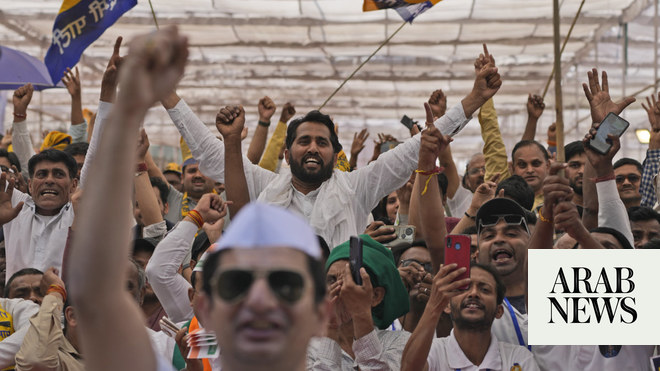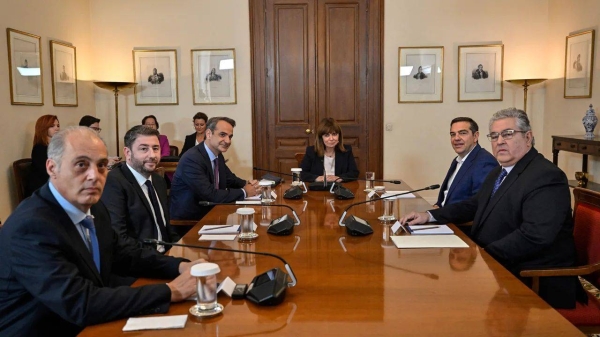
Georgia"s Prime Minister Irakli Kobakhidze leaves the impression of a relaxed, yet composed and focused man.
No big entourage in tow for our interview, he readily chatted about football, remembering a moment of pride over domestic legend Temur Ketsbaia, a former Newcastle United player, and pointing out there"s a new, rising star at the same club.
At the same time, Kobakhidze clearly knows what is at stake for his country in the upcoming parliamentary elections on Sunday — a pivotal, high-velocity moment as the outcome could potentially shape the nation’s future integration within the EU and its movement away from Russian influence.
The political landscape in Georgia has become increasingly polarised, with opinion polls continuing to present unreliable and contradictory forecasts. This was particularly palpable in Tbilisi, where a big political rally was taking place on the same day as our interview: the roads were all being closed and stages set for the evening, as thousands were expected in the streets of the capital.
While the ruling Georgian Dream party is framing the vote as a choice between "peace and war", opposition parties see the election as a battle between the democratic West and authoritarian Russia.
Euronews spoke with Kobakhidze in an in-depth interview about the importance of the elections, given the backdrop of European Union accession talks and questions over Russian influences.
Euronews: For you, as a young prime minister, what do you see as the future of Georgia?
Irakli Kobakhidze: We are anticipating really crucial elections for Georgia. We are enjoying quite rapid development in our country, but there are still challenges.
We are saying very directly and very explicitly that this election is also a referendum about the war and the peace issue.
The Georgian Dream government, we believe, is the strongest guarantee for peace in this country, but it"s also about the development of the country.
Over the last two and a half years, we have enjoyed almost double-digit economic growth, and we had the highest growth not only in the region but also in Europe.
The average economic growth in Georgia was around 9.7% in 2021, 2022 and 2023. And also this year"s preliminary figure is 10% economic growth. So for us, keeping this trend is very important.
We know that without proper economic figures Georgia will never be accepted as a member, a fully-fledged member, of the European Union.
Euronews: What is the level of dialogue then with the EU in terms of your EU membership and what is the next stage of that for Georgia?
Kobakhidze: Unfortunately, we are facing some challenges in terms of dialogue at the moment, but in general, if we summarise the outcomes of our policies, the Georgian Dream government has managed to achieve all the important steps towards European integration.
We managed to sign the Association Agreement with the European Union back in 2014.
We managed to sign the DCT with the European Union. We got the visa-free regime for our citizens.
And finally the Georgian Dream government managed to get candidate status for Georgia.
We strongly believe that as soon as these elections are over and as soon as the war in Ukraine is over, we will essentially improve and restart relations between Georgia and the EU and also between Georgia and the US.
Euronews: As a Georgian, what does Europe mean to you, and what would it mean to be part of that club that is seen as the European Union?
Kobakhidze: To be part of the European family is a kind of historic choice for Georgia and for Georgians.
You know that we are a Christian nation and Europe was always associated with Christianity. It was defending it, protecting Christianity for Georgia.
So that"s why Europe was always a kind of natural choice for Georgia and for Georgians.
And that is one of the, or the strongest reason, why we want to be a fully-fledged member of the European family.
[Being in] Europe also means a higher level of prosperity which means development for Georgians.
So that"s why we are very much committed to this foreign policy priority of Georgia.
Euronews: Are you pro-Russian or anti-European? Can you put it to rest once and for all for us?
Kobakhidze: We are clearly pro-European as a government, and we have evidenced it by our actions. And again, there are very specific actions through which we have managed to move the country towards the EU.
That"s why there is no space for these kinds of manipulations from the opposition. That"s their choice. That"s their job. That"s part of democracy.
We will continue to do everything to promote Georgia"s EU accession in the future.
Euronews: As well as talking obviously, to the EU, which you all clearly are doing, you speak to governments all around the world. When was the last time you spoke to the Kremlin?
Kobakhidze: We have no diplomatic relations with Russia. Georgia is maybe the only country in the region which has no diplomatic relations with Russia.
And we have communication with our western partners in Europe and the US. That"s the current state of affairs.
Euronews: Well, this week, again, we"ve seen elections in other countries, and in particular Moldova, there was a lot of controversy in terms of Russia"s involvement in the political process there. Will we see anything like that come here to Georgia?
Kobakhidze: I can say that Russia is not influential in Georgia.
There are no political parties in which they would have influence. There are no media channels with their influence.
So that"s why the Russian side cannot influence the elections in Georgia.
Euronews: Looking in, it seems that you"re matching certain Kremlin narratives in terms of some of the policies and laws that are being introduced here, such as the "foreign agents" and LGBTQ+ laws. Is that something that you would say is following in their footsteps?
Kobakhidze: These are the decisions made by the Georgian government. And these decisions have nothing to do with the decisions made by the Russian government.
We have introduced the Transparency Law, and the content of this law has nothing to do with the content of the Russian law about NGOs, its only about transparency.
The other thing which is envisaged by this law is to ensure that the NGOs are publicising their annual financial declarations to the Minister of Justice, and that"s it.
There are no restrictions. That"s why this messaging about the Russian law was completely fake. And the laws about LGBTI, that"s also our national decision.
Euronews: When it comes to war in Ukraine, there seems to have been a shift in tone. Is Georgia seeing this as an opportunity to have its independent voice heard? And if there is an opportunity there, what is it for you?
Kobakhidze: Well, in general, we are strongly supporting Ukraine"s sovereignty and territorial integrity, and we have condemned the Russian military aggression many times.
We have joined more than 600 international acts in support of the sovereignty and territorial integrity of Ukraine and condemning the Russian military aggression.
So that"s why we can say very firmly that our position with regard to the ongoing war in Ukraine is very strong. And of course, this position is based on international law standards.
Euronews: Any war brings with it horrors that we see happening in Ukraine, and Georgia lost territories throughout history. How did that shape you as a person and a politician in terms of your policies throughout your career?
Kobakhidze: We have a very complicated history, especially over the last 30 years since the collapse of the Soviet Union.
But we have also learned a lot. And this experience is something that has helped us to avoid many problems over the last decade.
And for me, as a politician, this experience is very useful and very important.
Euronews: What does that mean for a country like Georgia that is surrounded by war?
Kobakhidze: It puts us in a very complicated situation, of course. But again, despite all these challenges, we have managed to keep peace in the country.
Euronews: How do you react to Western sanctions against Russia and what impact do they have on the region?
Kobakhidze: The opposition was very much pushing us to join these sanctions, but we made a different decision and I can explain it very easily.
The share of Georgian trade and the entire Russian trade is 0.3%. Of course, Georgia can not damage the Russian economy by introducing economic sanctions.
At the same time, introducing sanctions would mean the escalation of the conflict. So that"s why we had very strong grounds for not following the opposition"s demand.
But again, we are also doing our best not to let anybody to use Georgian territory to avoid the sanctions.
Euronews: Let"s talk trade and energy security, which is very important for this area. Where does Georgia play into that? The strategic location is crucial for Georgia, isn"t it?
Kobakhidze: Strengthening Georgia"s connectivity is a key task for us, especially under the new geopolitical circumstances.
For example, we have a very important strategic project which connects us with Azerbaijan and Turkiye.
The Black Sea underwater electricity cable and the Internet cable projects will connect Georgia with the European market.
And we are also investing a lot into the development of infrastructure. We have managed to build around 300 kilometres of highways in Georgia and now we have ordered the construction of a new port on the Black Sea.
We are also constructing a new Tbilisi international airport and we are expanding the capacities of the Kutaisi International Airport. — Euronews












